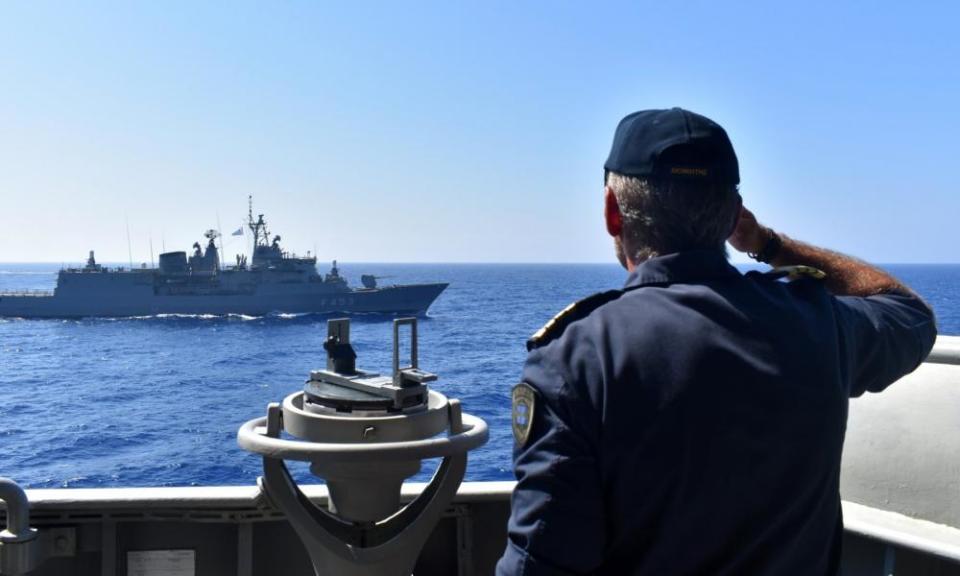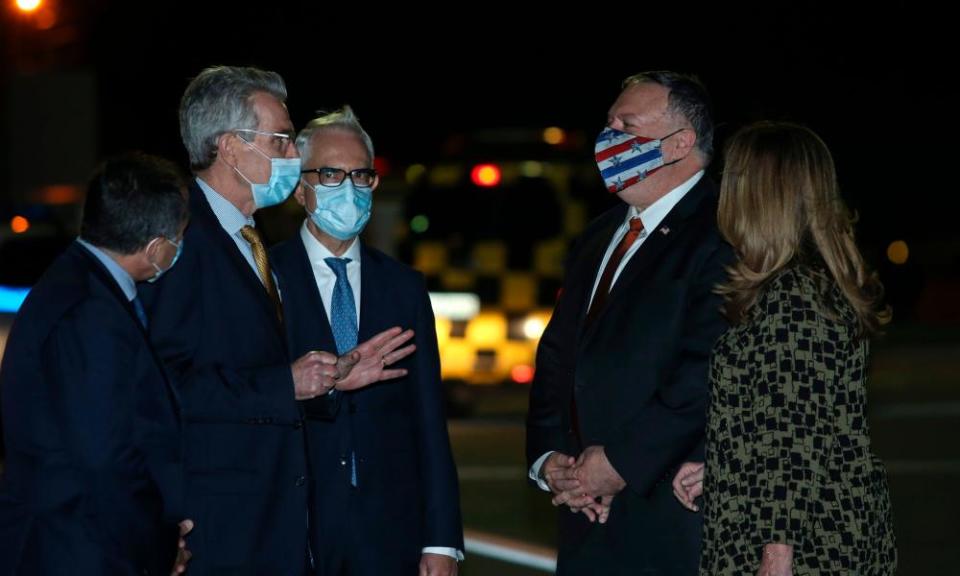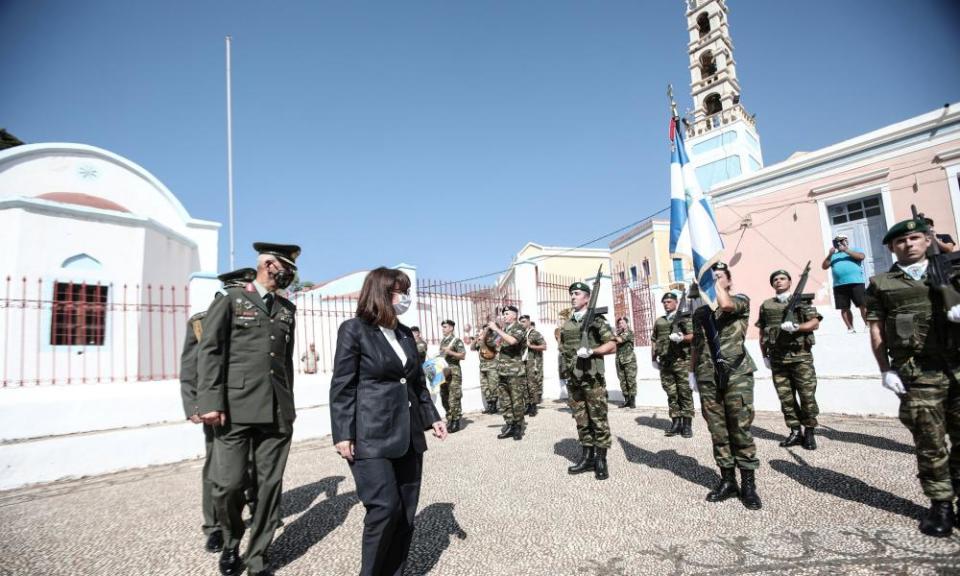Mike Pompeo due in Athens amid spiralling tensions between Greece and Turkey

Like others in the Greek officer class, the former V-Adm Vasilios Martzoukos believes in the power of military might. In a career punctuated by crises with Turkey, the threat of armed conflict reinforced his conviction, long ago, that “if you want peace, you prepare for war”.
“It’s the strange thing about deterrence,” the retired admiral said. “The more you don’t want war, the more you have to appear ready for it.”
Rarely has the adage seemed more compelling. Against a backdrop of spiralling tensions with Ankara, intense international diplomacy, and prospective talks to break the deadlock, Athens has announced it will be bolstering the country’s military capabilities.
The weapons programme, the biggest in decades, will see Greece buy fighter planes, frigates, helicopters and missile systems.
In addition to 18-French-made Rafale jets and four multi-purpose frigates, older warplanes and fighting vessels will be upgraded, said the Greek prime minister, Kyriakos Mitsotakis, unveiling the €6.8bn (£6.2bn) defence plan. New anti-tank weapons, navy torpedoes and air force missiles will also be acquired with the country rejuvenating its arms industry, buttressing its cyber attack defences and recruiting 15,000 troops over the next five years.
“The measures will be a great boost to our armed forces,” said Martzoukos, who commanded destroyers and frigates while in service. “And it will help act as a deterrent. The other side has to be convinced that you have the power, that you will use your armed forces if necessary.”
Even by the standards of historic animosity between Greece and Turkey it has been an unusually hot summer. Tensions over potentially lucrative gas reserves in the eastern Mediterranean have brought the neighbouring countries closer to war than any other time since 1996 when the Nato rivals almost clashed over an uninhabited islet in the Aegean.

The Greek foreign ministry’s announcement of exploratory talks “soon” recommencing has done little to allay fears the drama is not over. The talks, stalled in their 16th round in 2016, had focused solely on resolving the issue of disputed maritime zones.
“Mutual mistrust is such that their resumption comes without any communication between the two countries’ foreign ministers,” said international relations professor Constantinos Filis. “Already Ankara has signalled that it wants to bring other unilateral claims, including demilitarisation of Greek islands, to the table. I’m not optimistic.”
In an inauspicious move a Turkish drone flew over the isle of Kastellorizo at the weekend blaring the Turkish national anthem and dumping red paint on a Greek flag carved into it rock face. Athens described the incident as a deliberate attempt to “dynamite” prospects of detente.
Not since the Turkish invasion of Cyprus in 1974 have bilateral tensions been as high.
In a first, gunboats from both sides had fanned across the seas with ever more fighter jets taking to the skies to assert competing energy claims.

Photograph: Presidency of the Hellenic Republic/Reuters
The seven-week standoff – spurred by the discovery of underwater resources – escalated after Turkey deployed the Oruç Reis research vessel, escorted by navy ships, to conduct seismic surveys in contested waters on the edge of Greece’s continental shelf.
Related: How a rush for Mediterranean gas threatens to push Greece and Turkey into war
Athens responded by placing its armed forces on high alert amid growing fears of an accident, or a miscalculated move, taking the friction to another level.
Live-fire exercises by the Turkish navy off Cyprus – and the spectre of a second survey vessel being dispatched to explore the seas off the divided island – have added to the hostility of overlapping claims to regional waters. In a dispute that has become increasingly linked to Greek-Turkish differences, Ankara began drilling for oil and gas off Cyprus last year saying it was acting to protect the island’s breakaway Turkish Cypriot community after the discovery of reserves by Nicosia’s internationally recognised Greek-Cypriot government.
A breakthrough came when Turkey’s president, Recep Tayyip Erdoğan, under pressure from the EU and US, declared the Oruç Reis had been returned to base on 13 September to give diplomacy a chance.
“It’s been a very worrying period for everyone,” said a defence attache assigned to an EU embassy in Athens. “It’s so difficult for either country to find an off-ramp to de-escalate when at the same time Turkey’s president has used such strong rhetoric to appeal to his nationalist base.”
With the vessel’s withdrawal, EU leaders have heaved a sigh of relief. The tensions have put Turkey ever more at odds with the bloc. Possible economic sanctions against Ankara were on the agenda of a crucial EU summit due to start last week but delayed until 1 October after the European council president, Charles Michel, was forced to go into quarantine because of coronavirus.
Kostas Ifantis, a professor of international relations at Athens’ Panteion University, said the summer showdown has been a wake-up call.
“This was not the usual tug of war but a prelude to war,” said the Turkish affairs specialist who spent much of the past decade teaching in Istanbul. “Conflict between Greece and Turkey would solve nothing at all. Both know they could bomb each other into the stone age, but what would that achieve? There is no choice but to restore the lines of communication and engage in dialogue.”
With US secretary of state, Mike Pompeo, due to arrive in Athens on Tuesday – barely weeks after visiting Cyprus in a bid to defuse tensions – Mitsotakis has not ruled out meeting Erdoğan. Pompeo is expected to discuss enhancing military cooperation with Athens amid deteriorating US-Turkish ties strained further by Ankara’s purchase of Russian S-400 missiles.
Related: The Guardian view on Turkish-Greek relations: dangerous waters | Editorial
Mitsotakis hopes the arms purchases will redress years of military cutbacks imposed during the country’s decade-long debt crisis. Some €2.5bn recently raised in a bond auction will help finance the new programme.
The centre-right government has also raised the prospect of prolonging compulsory military service, highlighting Athens’ view of conscripts as a vital way of mobilising manpower at times of crisis. With 110,000 soldiers, seamen and airforce personnel, Greek armed forces are vastly outnumbered by Turkey, prompting Erdoğan to not only call the Greek military machine “dilapidated” but insist it would be no match for a country that has the second largest standing army in Nato.
“They’re either going to understand the language of politics and diplomacy, or in the field with painful experiences,” he declared earlier this month.
The military boost follows a concerted diplomatic campaign by Athens that has resulted in Brussels expressing support for both Greece and Cyprus. But with the new purchases expected to be years in the making, operational readiness is also being heightened. “I’ve never seen, nor heard, the Greeks spoiling for a fight,” said the Athens-based defence attache. “But they train hard, work hard and, remarkably, after so many pay cuts have an incredibly strong sense of duty to their country.”
Martzoukos is the first to agree. “We know what war is and it is the last thing we want. But we also know every rock in the Aegean and with cold logic we will do everything to defend our territorial sovereignty. There’s not much militarily you can hide these days but what Turkey doesn’t know is our courage and operational readiness.”

